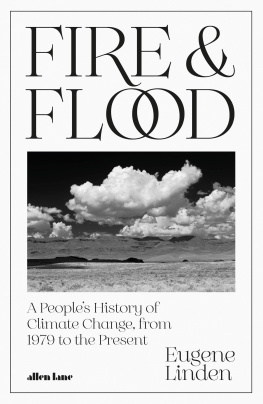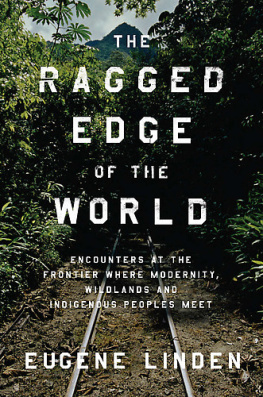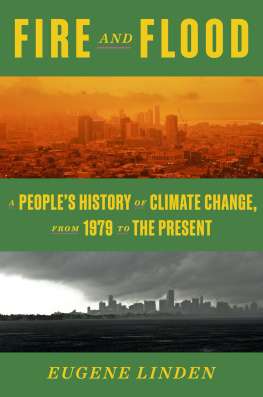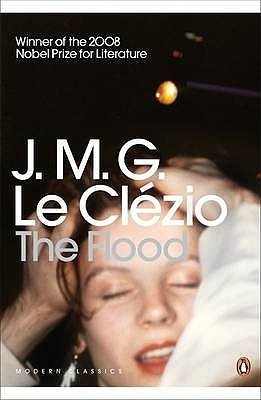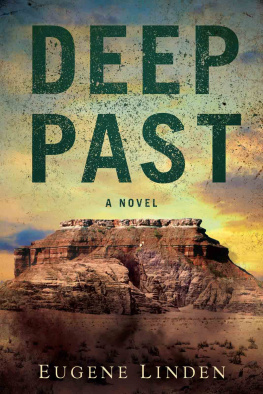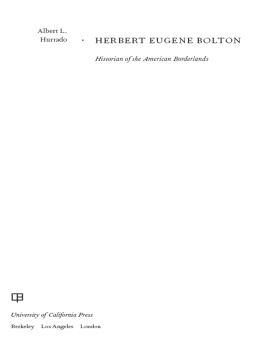Eugene Linden - Fire and Flood
Here you can read online Eugene Linden - Fire and Flood full text of the book (entire story) in english for free. Download pdf and epub, get meaning, cover and reviews about this ebook. year: 2022, publisher: Penguin, genre: Politics. Description of the work, (preface) as well as reviews are available. Best literature library LitArk.com created for fans of good reading and offers a wide selection of genres:
Romance novel
Science fiction
Adventure
Detective
Science
History
Home and family
Prose
Art
Politics
Computer
Non-fiction
Religion
Business
Children
Humor
Choose a favorite category and find really read worthwhile books. Enjoy immersion in the world of imagination, feel the emotions of the characters or learn something new for yourself, make an fascinating discovery.
- Book:Fire and Flood
- Author:
- Publisher:Penguin
- Genre:
- Year:2022
- Rating:5 / 5
- Favourites:Add to favourites
- Your mark:
- 100
- 1
- 2
- 3
- 4
- 5
Fire and Flood: summary, description and annotation
We offer to read an annotation, description, summary or preface (depends on what the author of the book "Fire and Flood" wrote himself). If you haven't found the necessary information about the book — write in the comments, we will try to find it.
Eugene Linden: author's other books
Who wrote Fire and Flood? Find out the surname, the name of the author of the book and a list of all author's works by series.
Fire and Flood — read online for free the complete book (whole text) full work
Below is the text of the book, divided by pages. System saving the place of the last page read, allows you to conveniently read the book "Fire and Flood" online for free, without having to search again every time where you left off. Put a bookmark, and you can go to the page where you finished reading at any time.
Font size:
Interval:
Bookmark:



Eugene Linden is an award-winning journalist and the author of The Parrots Lament, The Future in Plain Sight, Silent Partners, and several other books on animals, the environment, and other issues relating to humanitys place in the natural order. His previous book on climate change, Winds of Change, received the Grantham Prize Special Award of Merit. He has consulted for the U.S. State Department, the UN Development Program, and he is a widely travelled speaker and lecturer before audiences ranging from the intelligence community to the congregation of the Cathedral of Saint John the Divine. He lives in the Hudson Valley, in New York.
Deep Past
The Ragged Edge of the World
The Winds of Change
The Octopus and the Orangutan
The Parrots Lament
The Future in Plain Sight
Silent Partners
Affluence and Discontent
The Alms Race
Apes, Men, and Language
To the memory of those prophetic scientists who early on warned of the enormous costs of tampering with the atmosphere, a group that includes Wallace Broecker, Sherwood Rowland, Ralph Cicerone, Paul Crutzen, Stephen Schneider, and Hans Oeschger, among many others; and also to those scientists still living who were first responders to the climate crisis, including George Woodwell, Mario Molina, and Veerabhadran Ramanathan; and finally to those scientists, notably Michael Mann, who fought back against the smears and harassment inflicted by climate deniers.
We should have listened to all of you.
What is the use of having developed a science well enough to make predictions if, in the end, all were willing to do is stand around and wait for them to come true?
F. SHERWOOD ROWLAND in his speech accepting the Nobel Prize in Chemistry in 1995
Call it what you like, climate change or global warming, its here and its going to get worse, very likely far worse. Sixty years from now, people may wonder what happened in the past that allowed this nemesis to ruin the world. What were the decisions, or lack thereof, the missed opportunities, the political failures that caused a technologically advanced civilization to continue to alter earths climate even as its leaders knew better? These are the questions this book will attempt to answer.
More than four billion people have been born since climate change became a mainstream issue in 1988. More than five billion people have been born since the issue first appeared on President Jimmy Carters agenda. Billions of people, now well into adulthood, have lived their entire lives under the specter of global warming. During the past decade, average global temperatures crept up more than 1 degree Celsius over average levels before the Industrial Revolution. In fact, average temperatures are now regularly over the upper bound of what has prevailed since the dawn of the Holocene epochthe period, starting 11,600 years ago, during which a human-friendly climate nurtured the dawn of civilization and allowed human numbers to grow from roughly five million to nearly eight billion. Noting this inflection point, renowned climate modeler Stefan Rahmstorf put up a sardonic post on Facebook congratulating humans because we have now left the Holocene. Several hundred million people have recently been born into a new climate epoch.
Roughly one-third of the worlds population is unaware that global warming is happening, and the majority of those who are aware that we are changing the climate are either insufficiently alarmed at the prospect or already too fatalistic.
So here we are, in the first innings of a rapid climate change event that is already getting very costly. Was this predicted? Yes, perhaps more than any disaster in history. Could this have been averted? This turns out to be a charged question. We have had more than thirty years of warnings, innumerable conferences and scientific gatherings, even ratified treaties on preventing a climate catastrophe. In recent years, however, the idea that we never had a chance has gathered strength. This argument holds that in the early 1990s, when the scientific consensus on the threat solidified, renewables were too expensive and inefficient to replace fossil fuels and, furthermore, that people did not consider global warming to be an imminent threat, which meant that there was no public alarm to propel political action (a mobilized populace being a necessary precondition to break the hold of fossil fuels on the global economy).
These are not trivial arguments, but they arent true, as I will explain. We could have taken action, and its important to understand why we didnt, because the reason points directly to what is likely to happen next and what we can do about it.
Many factors, of course, explain societys response to the discovery that our own actions are changing the climate. Looming over all of them has been the role of business and finance. Indeed, the business world has been the master puppeteer in terms of influencing public awareness, politicians, even the presentation of the science. Looking back at the history of the modern climate change era, we see that if the business community does not want something to happen, it usually doesnt.
Obviously, there are many competing interests in the business community. That said, the record shows which voices were dominant at critical points during the climate change era. During most of that time, the dominant messaging came from the wide spectrum of interests related to fossil fuels with the support of the even broader community of business interests who shared an antiregulatory bias. As we will see, these voices outweighed the discoveries of scientists and the ever more alarming signals coming from the climate itself. From the beginning, business interests have proved adept at reframing the issue, dismissing the risks, demonizing the scientists, and defaming those seeking action as elitist dilettantes who want to tell you what to do and take away your job.
The posture of the business community also figured in the biggest missed opportunity of the climate change era, as the giant emerging economies were making decisions at the beginning of their push for industrial development and expansion of their energy infrastructures. Given a choice between renewables and fossil fuels, almost all chose coal. The greenhouse gas (GHG) emissions of the massive buildout that followed have much more than outweighed all the efforts (such as theyve been) of the developed nations to reduce their dependence on carbon to power their economies. Indeed, in 2019, China alone emitted more greenhouse gases than all thirty-eight developed nations in the Organization for Economic Cooperation and Development (OECD) combined.
The one thing the business and finance community could not and cannot influence is reality itself, although it has proved adept at distorting the public perception of the impacts of changing climate that have been staring us in the face. As these impacts have become more frequent and intense, they have broken through the fog of disinformation disseminated by fossil fuel interests. In fact, the reality of climate change has reached a point where it has altered the posture of much of the business community toward the threat. The question of the day is whether those alterations will be sufficiently broad that this immensely powerful sector can become part of the solution and help reverse the momentum of climate change before it is too late.
Next pageFont size:
Interval:
Bookmark:
Similar books «Fire and Flood»
Look at similar books to Fire and Flood. We have selected literature similar in name and meaning in the hope of providing readers with more options to find new, interesting, not yet read works.
Discussion, reviews of the book Fire and Flood and just readers' own opinions. Leave your comments, write what you think about the work, its meaning or the main characters. Specify what exactly you liked and what you didn't like, and why you think so.

